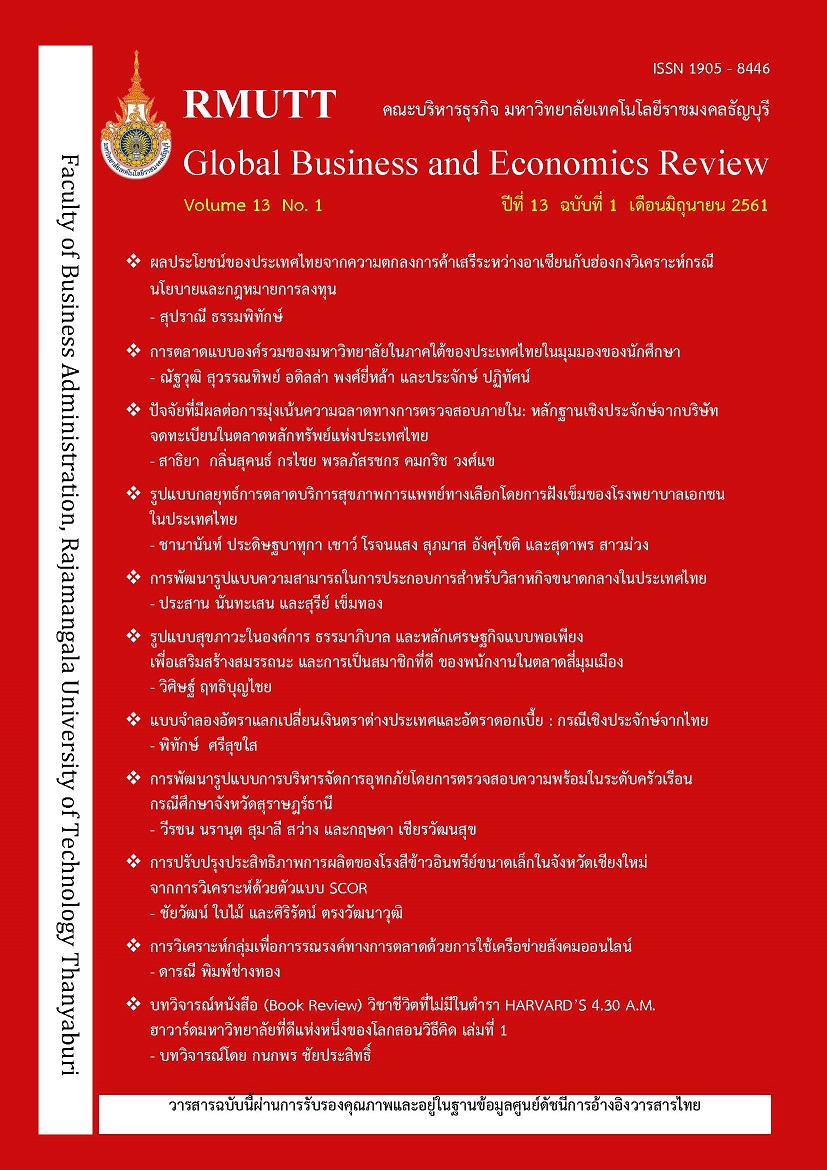THE MODEL OF ORGANIZATION WELL-BEING, GOOD GOVERNANCE AND SUFFICIENCY ECONOMIC PHILOSOPHY TO ENHANCE PERFORMANCE AND GOOD MEMBERSHIP OF EMPLOYEES WITH THE MUM MUENG RUNGSIT MARKET IN THAILAND
Keywords:
Organizational Well-Being, Good Governance, Sufficient Economic Philosophy, Competency Based Approach, Good MembershipAbstract
This research has two purposes: (1) To study factors influencing performance enhancement and good membership of employees in the Mum Mung, Rungsit Market, Thailand and (2) To find model of corporate well-being, good governance and sufficiency economic philosophy to enhance performance and a creation of a good membership of employees in the Mum Muang, Rangsit Market. The sample consisted of 665 employees in the mum muang, Rangsit Market. The sample was calculated by using Taro Yamane formula with 0.04 confident levels. The sample size was 339 employees. The data were collected through questionnaire. On content valid and Reliability The research found that 1) The Factors influencing performance enhance were A creation of Good Membership factors (β = 0.68), Economic Sufficient Philosophy factors (γ = 0.23), Organizational Well-Being factors (γ= 0.17) Good Governance factors (γ = 0.08), respectively, For the factors influencing the creation of good membership of employees in the mum muang, Rangsit Market, were from the Sufficiency Economy Philosophy factors (γ = 0.43). Good Governance factors (γ = 0.32) and organizational well-being factors (γ = 0.20), respectively. 2) Organizational well-being model, Good Governance and Sufficiency Economic Philosophy of employees in the Mum Muang, Rangsit Market must be a mixed Good membership can build a productive working capacity. Management must pay attention to the use of good governance corporate well-being and the indispensable is to raise awareness about the implementation of sufficiency economy philosophy to apply to all employees. It is the duty of the management to have a clear plan to create happiness in the organization. Contributes to the happiness in the organization create a happy society use the principles of good governance. To create a fair organization. Create a self-sufficient economic concept for everyone in the organization. To resist the current trend of consumerism. These factors will help make the organization a good member of the organization. And they can build their own capacity for continuous work. The result is a quality organization.
References
เกษม วัฒนชัย. (2549). การเรียนรู้ที่แท้และพอเพียงในหลักคิด “พอเพยีง”. กรุงเทพฯ: สำนักพิมพ์มติชน.
คณะอนุกรรมการขับเคลื่อนเศรษฐกิจพอเพยีง สำนักงานคณะกรรมการพัฒนาการเศรษฐกิจและสังคม แห่งชาติ. (2556). เศรษฐกิจพอเพยีง. สืบค้นจาก http://www.sufficiencyeconomy.org/ images/suff/suff-econ-.pdf
โครงการพัฒนาแห่งสหประชาชาติประจำประเทศไทย. (2550). รายงานการพัฒนาคนของประเทศไทย ปี 2550. กรุงเทพฯ: องค์การสงเคราะห์ทหารผ่านศึก ในพระบรมราชูปถัมภ์.
ชาญวิทย์ วสันนนต์ธนสรัตน์. (2551). องคก์รแห่งความสุข 8 ประการ. หมอชาวบ้าน, 30(349), 18-25.
ตลาดสี่มุมเมือง. (2558). แนะนำตลาดสี่มมุเมือง. สืบค้นจาก http://www.taladsimummuang.com/ dmma/portals/About.aspx?id=29
ธำรงศักดิ์ คงคาสวัสดิ์. (2548). เริ่มต้นอย่างไร เมื่อจะนำ Competency มาใช้ในองค์การ. กรุงเทพฯ: สมาคมส่งเสรมิเทคโนโลยี (ไทย-ญี่ปุ่น).
บุษบง ชัยเจริญวัฒนะ และบุญมี ลี้. (2544). ตัวชี้วัดธรรมาภิบาล. นนทบุรี: สถาบันพระปกเกล้า.
ปรีชา ชื่นชนกพิบูล และประกอบ คุณารักษ.์ (2558). รูปแบบนวัตกรรมการบริหารเพื่อพัฒนางานของ ศูนย์บริการศึกษานอกโรงเรียนอำเภอ. วารสารวชิาการมหาวิทยาลัยอสีเทริ์นเอเชีย, 4(2), 23-31.
วิเชียร วิทยอุดม. (2549). พฤติกรรมองค์การ (พมิพ์ครั้งท ี่3). กรุงเทพฯ: ธีระฟิล์ม.
วินัย ประวันนา. (2544). การศึกษารูปแบบการดำเนินการและปัญหาการดำเนินการตามแนวเศรษฐกิจพอเพียงของโรงเรียนแกนนำ สังกัดสำนักงานการประถมจังหวัดขอนแก่น. (ปริญญานิพนธ์ปริญญา มหาบัณฑิต, มหาวิทยาลัยมหาสารคาม).
ศิรินันท์ กิตติสุขสถิต กาญจนา ตั้งชลทิพย ์สุภรต ์จรัสสิทธิ์ เฉลิมพล สายประเสริฐ พอตา บุนยตีรณะ และ วรรณภา อารีย์. (2555). คู่มือการวัดความสุขด้วยตนเอง. นครปฐม: สถาบันวิจัยประชากรและ สังคม มหาวิทยาลัยมหิดล.
สำนักงานคณะกรรมการการศึกษาแห่งชาติ. (2550). เศรษฐกิจแบบพอเพียง. สืบค้นจาก http://www.thaiedresearch.org/result /result.php?id=3996.
สำนักงานคณะกรรมการพัฒนาการเศรษฐกิจและสังคมแห่งชาติ. (2556). ภาวะสังคมไทยไตรมาสสาม ปี 2556. สืบค้นจาก http://social.nesdb.go.th/social/Default.aspx?tabid=127&articleType =ArticleView&articleId=144
สำนักงานกองทุนสนับสนุนการสร้างเสริมสุขภาพ. (2552). คู่มือมาสร้างองค์กรแห่งความสุขกันเถอะ. มปท.
อภิชาติ ภู่พานิช. (2551). การใช้ดัชนีวัดระดับความสุขในการทำงานของบุคลากรสังกัดสำนักงานอธิการบดี มหาวิทยาลัยธรรมศาสตร์. (วิทยานิพนธ์ปริญญามหาบัณฑิต, มหาวิทยาลัยธรรมศาสตร์).
อาภรณ์ ภู่วิทยพันธ์. (2548). Career development in practice (พิมพ์ครั้งที่ 2). กรุงเทพฯ: เอช อาร์ เซ็น เตอร์.
Morris, C. G., & Maisto, A. A. (2001). Understanding psychology (5th ed.). New Jersey: Prentice Hall.
Niehoff, P. B. (2001). A motive-based view of organizational citizenship behaviors: applying an old lens to a new class of organizational behaviors. Digital Dissertation: Kansas State University.
Robbins, S. P. (2001). Organizational behavior (9th ed.). New Jersey: Prentice-Hall.
Smith, C. A., Organ, D. W., & Near, J. R. (1983). Organizational citizenship behavior: its nature and antecedent. Journal O & F Applied Psychology. 68(4), 653-663.
Yamane, T. (1967). Statistics: an introductory analysis, (2nd ed.). New. York: Harper and Row. Zwell, M. (2000). Creating a culture of competence. NewYork: John Wiley and Sons.
Downloads
Published
How to Cite
Issue
Section
License
The articles published in this journal are the intellectual property of their respective authors.
The views and opinions expressed in each article are solely those of the individual authors and do not reflect the positions of Rajamangala University of Technology Thanyaburi or any of its faculty members. All components and content of each article are the sole responsibility of the respective authors. In the event of any errors, the authors shall bear full responsibility for their own work.








